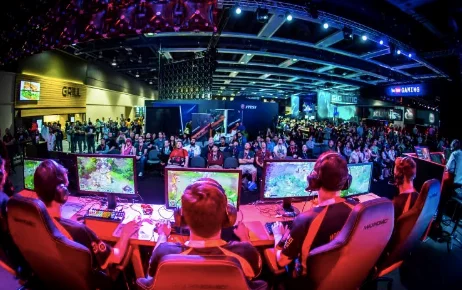Blockchain technology offers an unparalleled level of security in recording information, significantly counteracting hacking, altering, and fraudulent activities. This technological innovation serves as a vital tool in esports, offering a reliable, decentralized record-keeping system. It not only augments the organization of competitions but also enhances player interactions and guarantees the transparency and security of transactions.
This article delves into the transformative effect of blockchain technology on esports, from ensuring transactional security and facilitating fan interactions to improving player contract management. We will examine the current applications of blockchain, assess its advantages, and estimate its potential impact on the future of competitive gaming. For esports enthusiasts, you can visit a specific linked page and judiciously utilize cryptocurrency to support your preferred team.
Deciphering Blockchain’s Significance in Esports
Elementary Understanding of Blockchain in Gaming
Blockchain technology functions as a secure digital ledger, recording transactions through numerous computers. Once information is logged using this technology, it remains unalterable unless the subsequent data is simultaneously changed, ensuring top-tier security and transparency. In the esports and gaming realm, blockchain effectively safeguards in-game data, such as player scores and in-game asset ownership, from manipulations. It also underpins smart contracts that automatically execute payments or other outcomes based on gaming results. This technology significantly reformulates the way esports transactions and interactions are managed, making online gaming tournaments more robust and secure.
Essential Advantages of Blockchain for Esports
Blockchain technology proffers significant benefits to esports, particularly by enhancing security and transparency. With its decentralized feature, blockchain logs in gaming outcomes, player transactions, and details of awards in an immutable fashion, minimizing cheating and fraudulence. The absence of a single institute having control over the gaming activities instills fairness in the system, fostering trust among players, developers, and spectators. Ultimately, this creates a secure and equitable setting for competitive gaming.
Principal Implementations of Blockchain in Esports
Fan Interaction and Tokenization
Blockchain technology enhances fan engagement within esports through a process called tokenization, allowing fans to vote, purchase digital merchandise, and receive rewards. Using tokens powered by blockchain, fans get a chance to influence minor team decisions, relish exclusive interactions, and access premium content. For instance, some esports teams release fan tokens, granting spectators the right to vote on matters like designing team jerseys and selecting match venues. This strategy amplifies fan participation, fortifies their loyalty towards the team, and enriches their overall experience.
Reliable and Transparent Betting
Blockchain technology substantially uplifts the reliability and transparency of betting systems within esports. Platforms utilizing blockchain technology can maintain immutable records of every transaction and outcome, reducing the propensity for fraudulent activities and boosting user trust. Platforms like Unikrn and FirstBlood employ blockchain technology to secure their betting procedures, enhancing user trust and satisfaction through transparent, reliable, and secure betting experiences.
Smart Contracts for Player Contracts and Transactions

Regarding player contracts and transactions in esports, blockchain technology facilitates the use of smart contracts. These code-based, self-enforcing contracts embed the terms of the agreement directly into the contract. It makes salary management and player signing processes clear and automated.
These contracts automatically manage payments or agreements when certain conditions are met, such as when players complete a specified number of games or achieve set targets. It eliminates disputes and ensures timely payments without the need for third-party intervention. Smart contracts simplify these agreements’ management, aiding in better tracking and smoother operations within the esports community.
Non-Fungible Tokens (NFTs) in Esports
Non-Fungible Tokens (NFTs), validated and owned by blockchain technology, operate as unique digital commodities. These tokens, within the esports sphere, are revolutionizing how fans engage with their preferred games and players. NFTs are used for collectibles, special gaming items, and digital player cards, allowing fans to possess unique or rare items. Notably, ‘League of Legends’ collaborated with a blockchain company, Dapper Labs, enabling spectators to acquire digital representations of significant game moments and achievements, enhancing their gaming experience.
Challenges and Limitations
Although blockchain technology stands to revolutionize esports, it confronts certain challenges like transactional speed (scalability), regulatory hurdles, and user adoption. For instance, during massive esports events, blockchain networks might encounter problems processing multiple transactions swiftly. Moreover, different regions may enforce varying regulations influencing gaming and betting platforms’ operations. Additionally, blockchain technology, being a novel concept for many, faces adoption resistance.
Developers are investigating potential solutions to these issues. For procedural limitations, advanced methods like layer-two protocols or sharding are being studied to enhance blockchain’s speed. Regulatory hurdles can be addressed through continuous dialogue with legal authorities, ensuring the legality of blockchain activities. Additionally, educational and awareness campaigns can help more individuals understand and trust blockchain technology, thus promoting wider acceptance within esports.
Future Outlook
As we look ahead, blockchain technology promises substantial transformations within the esports industry.
Expected improvements include enhanced data security, amplified fan engagements through tokens, and augmented usage of NFTs for unique collectible items, eventually rendering esports more open and engaging. Players might get more control over their digital assets, and fans could enjoy a more immersive experience with their favorite games and players.
Additionally, the use of blockchain technology in organizing tournaments and managing payments could minimize fraud and enhance fairness. It signifies esports’ transition towards decentralized, community-focused systems, possibly revolutionizing their commercial dealings to benefit everyone involved and ensuring equitable monetary distribution.
Wrapping Up
Blockchain technology holds great potential to revolutionize the esports industry by ensuring transactions’ safety and traceability while creating innovative channels for fan interaction and expenditure. Its relevance cannot be overemphasized for diverse esports stakeholders—players, fans, industry leaders—in understanding its benefits and dealing with its challenges. As blockchain technology’s importance within esports continues to grow, it’s crucial to stay abreast of developments and understand their extensive implications.
* This article, along with the provided links, is for informational purposes only and does not constitute financial or investment advice. We recommend doing your own research or consulting a professional before making financial decisions. We will not be held responsible for any loss caused by any information present on this website.